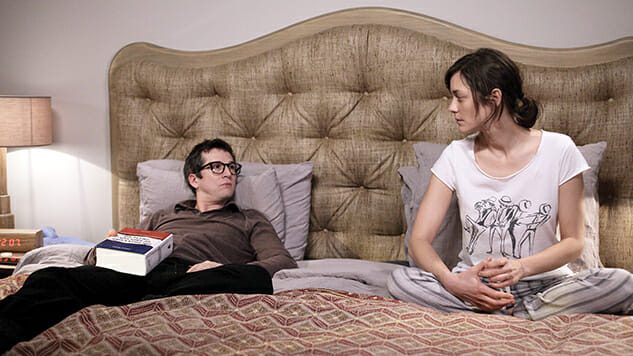Rock’n Roll
(2017 Tribeca Film Festival Review)
Photo: Tribeca Film Festival Movies Reviews Rock'n Roll
Rock’n Roll takes what made last year’s Toni Erdmann shocking and strange and augments its relationship study with the self-satirizing stylings of something like The Trip. Guillaume Canet’s film doesn’t care about Maren Ade’s dedication to realistic familial relationships or slow-burn sweetness, though, similar to the German-Austrian Oscar nominee, Rock’n Roll is still an unexpectedly insane foreign comedy that never seems to end. This film’s sweetness is of a different sort, derived from the depth of forgiveness between its put-upon stars that’s inherent to its escalating silliness. It’s the rare two-hour-plus comedy that can sustain its comedic energy, frothing its intoxicating wit into a silly frenzy, escalating to an absurdly spiked cappuccino that we’d be hesitant to accept if we knew what we were getting into from the beginning.
However, the film’s ridiculousness deserves a long hill to snowball down—when Rock’n Roll reaches the bottom, it’s impossible not to be bowled over. The film is faux-reality; not a mockumentary, but still allowing all its characters to play themselves. Marion Cotillard and her partner Guillaume Canet are both film professionals, acting in different projects, when Canet’s young co-star, sexy starlet Camille Rowe (playing his daughter in the film-within-a-film), mentions Canet’s milquetoast normalcy in an interview. He’s settled down, raised a son and isn’t the bad boy sailing atop anyone’s celebrity bang list anymore—especially (and specifically) Rowe’s.
Right away we’re subjected to the incriminating elements of Canet’s homey life: living upstairs from his mother, horseback riding, wearing an apron and, the ultimate sign of aged, unsexy masculinity, dealing with a sore testicle. Some of these elements turn back up, but all mostly exist as evidence supporting Rowe’s declaration—she wasn’t insulting her co-worker, just stating facts. The jokes here are swift, almost too sharp, like paper cuts, to immediately feel. Canet skewers both actors and their egos, but so does he take aim at business of movies in some excellent handheld shots tracking behind the scenes of a set or seeming to fortuitously catch the reactions of an offended party.
Still, who’s ever really mature enough to accept the process of getting old? Aging gracefully is especially hard for someone who is their work. So of course, if a beautiful young woman tells a stupid man that he isn’t “something,” well, then he wants to become it. Canet proceeds to have the midlife crisis to end all midlife crises, and since his problem isn’t his lack of a sexy job or a cool car, he’s the only one to blame. Shocking, sustained, outrageous body/prop humor pops up its Botox’d head, Canet taking on more and more physical augmentations until our very knowledge of the character’s progress becomes the film’s sustained joke. His transformation is the impotent Wile E. Coyote in pursuit of his lost, cooler-than-thou roadrunner.
This desperation manifests not just physically, but stylistically. Some oddball musical skits tear out of nowhere, like Lonely Island videos breaking out of the film’s intense realism, in strange outbursts of still-uncool balladic musical genres. Canet’s masculinity—not just his physique, but his swagger and strength—is constantly the center of attention, tortured on screen by meek framing and unflattering, awkwardly-staged realism. Canet’s not cool, but even at his most self-absorbed his performance is precisely directed so as to be, at his worst, pitiable.
Rock’n Roll isn’t satisfied only lampooning Canet. Cotillard is hilarious as a parody of her prestige drama persona, obsessing over goofy accents for a role and slinging inscrutable slang while declaring that the only roles worth taking are those with a disability or an accent. She initially seems to be a reactionary audience surrogate, which only makes her eventual, similar crisis even more endearing. The couple’s shared professional and personal insecurities escalate in an egalitarian display of mutual selfishness that embodies the inevitability of any good partnership once their paths reconcile.
In our modern media atmosphere, where the voyeurism of celebrity is so accessible via social media and tabloids and reality TV, viewers are ready to indulge some savage self-parody, already so close to these actors, directors and other celebrities to the extent that jokes mocking them (or how we perceive them) must hit the perfect balance between absurdity and believability in order to work as potent satire. In Rock’n Roll specifically, the realism of a film shoot and the workaday schedule of an actor need to match up with what people want to believe, so that when things go off the rails, the rails have been so clearly established that departure is noticeably deliberate. Rock’n Roll takes this necessary balancing act and continues to tip it further and further off the edge of the deep end, maintaining eye contact with the audience the whole way down. When the film finally topples into full-tilt weirdness, we’ve been so seduced by its relationship charms and quiet craft that accepting its spectacularly strange ending is just a matter of looking into our slightly woozy hearts.
Director: Guillaume Canet
Writer: Guillaume Canet, Rodolphe Lauga, Philippe Lefebvre
Starring: Guillaume Canet, Marion Cotillard, Camille Rowe
Release Date: February 15, 2017 (France); U.S. Premiere at the 2017 Tribeca Film Festival